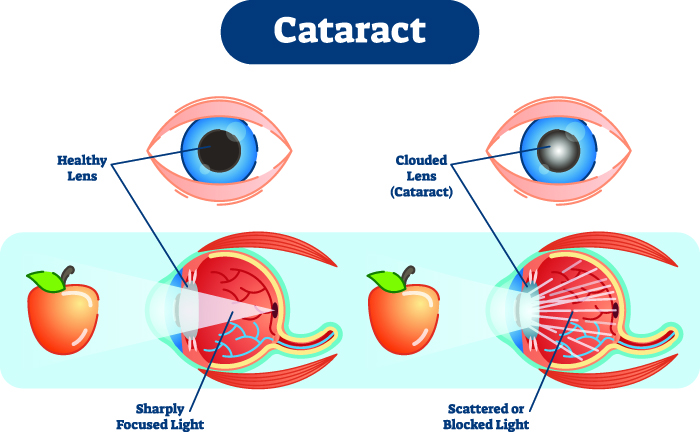Cataract Surgery in Karol Bagh, Delhi
Introduction
A cataract is a condition wherein the eyes’ lens starts clouding or starts appearing foggy. In this condition, the lenses end up giving a frosty-eyed vision to the patient.
Cataracts develop very slowly and might not disturb the vision early in the development. But as they grow bigger, they eventually start interfering with the vision. Initially, better lighting and different types of eyeglasses can be used as methods to deal with cataracts. Still, if the condition progresses further and interferes with the person from doing multiple activities, cataract surgery might be considered the best option.

What Are the Symptoms of Developing Cataracts?
The signs and symptoms of developing cataracts are
- Blurred vision
- Dim vision
- Light sensitivity
- Fading colors
- Double vision
- Eyeglass changes
- Needing better light for reading
When Should You Consult Your Doctor Regarding This Condition?
Cataract usually starts as a small patch of cloudiness in the vision. It only affects a tiny part of your lens and, with time, starts causing noticeable symptoms and significantly hampers your vision.
Request an appointment at Apollo Spectra Hospitals, Karol Bagh, New Delhi
Call 1860 500 2244 to book an appointment
What Are the Causes of the Formation of Cataracts?
Most cataracts usually develop because of aging. It can also be caused by previous eye surgery, diabetes, and long-term steroid usage.
What Are the Different Types of Cataracts?
Cataract has multiple subtypes, and they include:
- Nuclear cataracts - that affect the central vision of the eye
- Cortical cataract- starts affecting the peripheral vision or edges of the eye
- Posterior subcapsular cataract- this starts affecting the back of the lenses and interfere with the reading vision. This is also a type of cataract that progresses much faster than the other types.
- Congenital cataract- this is a genetic condition that causes the development of cataracts right from childhood.
What Are Some Risk Factors That Increase the Risk of a Person Getting Cataracts?
Certain factors increase the risk of a person getting a cataract, and they are:
- Aging
- Diabetes
- Smoking
- Obesity
- High blood pressure
- Exercise call conjunction
- Long term steroid usage
- Eye surgery
- Eye inflammation
- Eye injury
What Are the Main Methods of Prevention Against Developing Cataracts?
There are specific strategies that you can exercise to prevent your chances of getting this condition.
- Meeting with your health care provider regularly for regular checkups
- Quitting smoking
- Controlling diabetes
- Controlling blood pressure
- Wearing sunglasses
- Avoiding excessive alcohol intake
How Is a Cataract Diagnosed?
The diagnosis and treatment of cataracts require multiple instruments, and your doctor will take your complete health history and perform any one of the eye examinations below.
- Visual acuity test
- Slit-lamp examination
- Retinal exam
How Is This Condition Treated?
A cataract is usually a condition that cannot be successfully and completed treated with prescription glasses or medications. It needs surgery for complete and successful treatment.
Cataract surgery is recommended to the patient by the ophthalmic surgeon if the cataract starts affecting the patient’s quality of life by hampering the vision and making them unable to perform multiple daily activities.
Conclusion
A cataract is a fairly common eye problem that affects multiple people throughout the world. If you are experiencing any of the above-listed signs and symptoms, you must meet up with your health care provider for your regular eye check-up immediately.
It takes around 24 hours to get back to normal functioning levels after the cataract surgery.
No, it is impossible to get rid of cataracts naturally as they progress and worsen over time. However, you can inculcate some healthy lifestyle changes to keep cataracts at bay, such as attending regular eye checkups with your health care provider.
Completely ignoring and leaving the cataract untreated can lead to total blindness. It is essential and critical to meet up with your doctor as soon as the cataract starts interfering with your vision.
Symptoms
Our Doctors
DR. MRIDULA MEHTA
MBBS, MS - Ophthalmo...
| Experience | : | 22 Yeras Experience |
|---|---|---|
| Speciality | : | Ophthalmology... | Location | : | Chirag Enclave |
| Timings | : | Mon to Sat : 10:00 A... |
Our Top Specialities
NOTICE BOARD
CONTACT US
CONTACT US
 Book Appointment
Book Appointment



.svg)
.svg)
.svg)
.svg)








